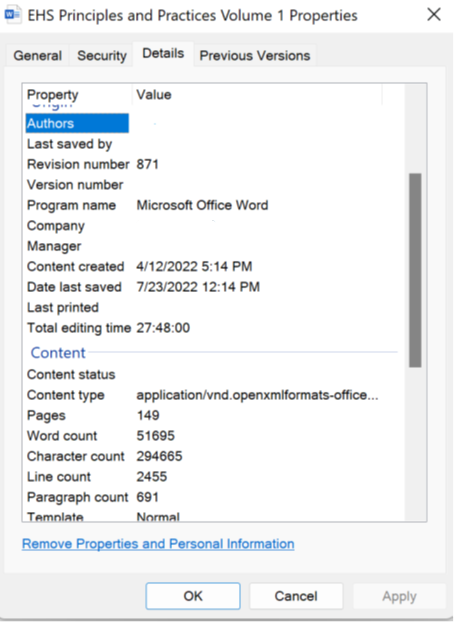“The attorney-client privilege is the bedrock principle of our legal system, … The confidential nature of the attorney-client relationship is no less important in government than in every other context where it exists.”
- Charles Ruff[1]
Hopefully you will never be involved in litigation, potential litigation, other legal issues or have to be concerned about them. Just in case, it is important to understand two important legal concepts: attorney-client privilege and work product doctrine. The following is meant to provide a cursory overview of these concepts because you may need a basic understanding. You should consult with your legal counsel for specific guidance.
5.1 What Are They?
To provide open discussions between a client and their lawyer, attorney-client privilege:
”…protects communications between attorney and client that are made for the purpose of furnishing or obtaining professional legal advice or assistance[2].”
In other words, your letters and e-mails to your legal counsel may be protected from disclosure to others.
The work product doctrine:
“Protects documents and tangible things that are prepared in anticipation of litigation by (or for) another party or its representative from disclosure to third parties.[3]”
If your legal counsel hires experts to gather information, conduct studies, prepare reports, etc. (work product), this information may be protected from disclosure.
5.2 What They Are Not?
It’s important to differentiate between Confidential Business Information (CBI) versus attorney client privilege and work product doctrine. These are two different concepts. Regulatory agencies may request information that, if available publicly, could harm your business by disclosing trade secrets, confidential commercial or financial information. To protect your organization from disclosure, you typically need to identify what submitted information is Confidential Business Information (CBI) and discuss why it should be treated and handled as Confidential Business Information (CBI). Various regulations define confidential business information and/or how to make claims (e.g., 29 Code of Federal Regulations (CFR) 90.33 Confidential business information, 40 Code of Federal Regulations (CFR) 763.179 Confidential business information claims).
Also, business advice, even if received from a lawyer, is not considered to be attorney client communication[4]. This can lead to issues with in-house counsel, which is discussed more in the upcoming section on In-House Counsel and Attorney Client Privilege.
5.3 What is Covered
Attorney client communication privilege protects communication, but not facts. For example, a Phase 1 Environmental Site Assessment (ESA) report, prepared before purchasing land to protect the purchaser from some environmental liability, is a statement of fact report that may not meet the privilege doctrine. If you want to protect other information that are not statements of facts (e.g., recommendations and conclusions), consider requesting a second report or letter that is privileged that provides this information.
5.4 How Do You Make and Keep Privilege?
I have worked with numerous attorneys and run across numerous methods to address attorney client privilege. Therefore, I would defer to the attorney for how they want it handled (i.e., it seems like every attorney has a different way of handling), but here are some general rules of thumb. Work product needs to be directed and/or requested by an attorney so it is protected by privilege. Just copying an attorney does not make the document privileged: You need to address them directly and have them solicit legal advice or communication. Labeling documents as attorney client privilege is a good idea, but not required and labeling everything as attorney client privilege may cast doubt on the validity. An important requirement in maintaining privilege for a document or communication is that you cannot disclose to others. I have not seen a numerical limit for the number of people that you can disclose the information and still maintain privilege, but generally the less the better. You should also use the “need-to-know” philosophy when distributing privileged information.
Internal compliance audits, because they involve compliance, meet the work product doctrine. Attorneys I have worked with typically send a written request for the audits to be conducted so the audit report meets the work product doctrine. If you come across criminal activities, you should get the attorney involved immediately even if not done under privileged.
5.5 In-House Counsel and Attorney Client Privilege
If you have in-house counsel, it can save money if you use them for legal advice and attorney client privilege. I check with your in-house counsel to make certain they are comfortable with that assertion. Because in-house counsel may serve many roles, it can be less clear whether they are providing business advice instead of legal advice and the audit privilege could be challenged if an issue arises[5].
5.6 What Else Can Be Done
If you have ever been involved in a lawsuit, you will be shocked by the amount of information that might be requested including:
- Computer files
- E-mails
- Printed documents
- Process controller data
- Text messages
A strong record retention policy can help minimize the amount of information that might be available. Chapter 16 provides more information on record retention.
Another rule-of-thumb is to tell employees not to put anything in writing (e.g., e-mail, text, social media, etc.) that they wouldn’t want to see on the front page of a newspaper. I like to keep notes on everything, so this is a difficult concept for me, but I understand the importance and comply. When I have an audience with site personnel, I like to convey this rule-of-thumb. It can be difficult to discern the significance of the issue, but you should be conservative if you are not certain.
If you are documenting a significant issue (e-mail, adobe or text document, or other electronic file, etc.) think, write and review closely and then double-check the recipient list before sending or posting. For electronic files, watch the metadata information on files: See if you have a system in place to clean metadata from files. In a Microsoft® Windows system, you can “right-click” on a file in Windows Explorer and select “Properties”. This will open a window that shows the authors, who saved the last version, the names of previous versions, etc., which might show information you do not want revealed.

5.7 Ethical Issues
After I looked over this chapter, I realized that, to some, this chapter may come across as an instruction on how to cover up issues. That certainly is not my intent. Personally, I have always considered my position was to help my clients and owners, but I would have drawn a hard line if I thought we might be impacting employee safety or the environment and nothing was being done to correct it. I feel fortunate that I was not faced with this issue. If you are faced with this issue, you may have some difficult decisions to make. Some options could include:
- Prepare internal documentation to protect yourself from liability and/or termination
- Report it to a higher authority within your company (i.e., above the level of your supervisor or the person who already knows about the issue, but has not done anything about it)
- Report it to your internal ethics or corporate governance hotline if you have one
- Report it to the applicable regulatory agencies
The obvious concern is that the company or employees find out what you did and retaliate (e.g., firing, demotion, docking pay). Fortunately, the Department of Labor has a whistleblower program that is designed to prevent retaliation against employees who make health and safety-related complaints[6]. I am aware of six environmental acts that contain whistleblower protections:
- Clean Air Act (CAA)
- Clean Water Act (CWA)
- Comprehensive Environmental Response, Compensation and Liability Act (CERCLA)
- Safe Drinking Water Act (SDWA)
- Solid Waste Disposal Act (SWDA)
- Toxic Substance Control Act (TSCA)[7]
You would need to review each of these acts to know the specifics of the whistleblower protection. For example, the Clean Air Act (CAA) excludes protections for anyone who deliberately caused the violation[8].
5.8 For Additional Information
- “In House Counsel and the Attorney Client Privilege” edited and reviewed by FindLaw Attorney Writers, last updated April 18, 2018 and accessed November 13, 2021 (https://corporate.findlaw.com/litigation-disputes/in-house-counsel-and-the-attorney-client-privilege.html)
5.9 References
[1] “Inspirational Stores” website, attorney client privilege quotes, accessed August 6, 20222 (https://www.inspirationalstories.com/quotes/charles-ruff-the-attorney-client-privilege-is-the-bedrock-principle/)
[2] “Attorney-Client Privilege” Legal Dictionary, The Free Dictionary by Farlex website accessed November 13, 2021 (https://legal-dictionary.thefreedictionary.com/attorney-client+privilege)
[3] “Work Product Doctrine” Thomas Reuter’s Practical Law Glossary, accessed November 13, 2021 (https://content.next.westlaw.com/Document/I03f4dac3eee311e28578f7ccc38dcbee/View/FullText.html?contextData=(sc.Default)&transitionType=Default&firstPage=true)
[4] “In House Counsel and the Attorney Client Privilege” edited and reviewed by FindLaw Attorney Writers, last updated April 18, 2018 and accessed November 13, 2021 (https://corporate.findlaw.com/litigation-disputes/in-house-counsel-and-the-attorney-client-privilege.html)
[5] “In House Counsel and the Attorney Client Privilege” edited and reviewed by FindLaw Attorney Writers, last updated April 18, 2018 and accessed November 13, 2021 (https://corporate.findlaw.com/litigation-disputes/in-house-counsel-and-the-attorney-client-privilege.html)
[6] “Whistleblower Protections“ Department of Labor website accessed February 20, 2022 (https://www.dol.gov/general/topics/whistleblower)
[7] “Whistleblower Protection” EPA website accessed February 20, 2022 (https://www.epa.gov/office-inspector-general/whistleblower-protection#:~:text=Whistleblower%20protection%20provisions%20are%20written%20into%20six%20environmental,Comprehensive%20Environmental%20Response%2C%20Compensation%2C%20and%20Liability%20Act%20%28Comprehensive Environmental Response, Compensation and Liability Act (CERCLA)%29)
[8] Clean Air Act (CAA) 42 United States Code (U.S.C.) §7622(g) (https://www.whistleblowers.gov/statutes/caa)
I am always open to comments and suggestions. You can contact me using the form below.
